-
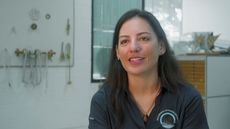
The Next Generation – Hōkūleʻa's First Female Captain and Navigator (Polynesian Voyaging Society)
Lehua Kamalu was the captain and navigator of Hōkūleʻa on the voyage along Kealaikahiki (Road to Tahiti) earlier in the year (April 2022). As Hōkūleʻa’s first female captain and navigator, she reflects on what the two roles mean and becoming a leader. "You no longer say oh, let me ask my teacher, let me ask the kapena. Because you are the kapena now. And the way you decide who's going to be on this crew, where are we going to go, how are we going to make this decision today about being prepared. It's kind of all on you. And then you start to lose sleep a little bit." - Lehua Kamalu
-
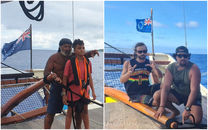
Traditional Sailing experience on Vaka Marumaru Atua
In November 2020, 11 year old Dominik Maao made his sailing debut as the youngest crew member to travel on the traditional voyaging Vaka Marumaru Atua. He learned the ropes under the guidance of his grand Uncle, Navigator Tetini Pekepo on the voyage from Aitutaki to Rarotonga, which took them just over a day (about 27 hours to complete). Almost a year later, his father Arerau Maao followed in his young sons footsteps, when he joined the crew for the first time, sailing back to Rarotonga from the Maao's home island of Aitutaki. He shared his experience with us here. {{26936}} Arerau who was born and raised on the island of Aitutaki holds the traditional title Kiikoro (Kiikoro ite Maru o te ao) and is the Pūtokotoko (right hand man) of Tamatoa Ariki. For the 32 year old father of four, sailing on a traditional vaka had been on his bucket list since he was a young boy, when he'd first seen the vaka Hokule'a, Te Au o Tonga and Takitumu sail in to the Aitutaki harbour in the 1990s. When the opportunity to join the crew came up, he jumped at the chance. "I thought to myself, you know what? You might only get to do this once in your life time so you may as well do it" said Arerau (also known as Alistar or Ali for short) {{26938}} The stars seemed to align in more ways than one for Ali who would normally be busy with his 9-5 as Cruise Director for the Air Rarotonga lagoon cruise. However, with the borders closed to tourists again due to the Covid pandemic he found himself with some time on his hands. The vaka had been in Aitutaki for the Bi-centennial Arrival of Christianity celebrations where the crew had been hosted for meals in the village of Arutanga and was set to sail back to Rarotonga. A conversation over dinner with a crew member led to Ali asking renowned traditional navigator (and captain of the Marumaru Atua) Peia Patai permission to join them for the sail back. Peia agreed and although Ali had not had any training or sailed on the open sea before, he was comfortable with the challenge because he was on the water every day with his job. {{26940}} "Going out on the ocean (on the Marumaru Atua) was a whole new experience for me. I was getting connected with our tupuna, our ancestors and how they used to sail the sea with no technology. Reading the stars, the waves, the current, the wind, where the sun rises, where the sun sets, where the moon rises. All of this was real" - said Ali One particular highlight for him was learning to steer with the tuoe (pictured below) "The first time I touched the tuoe I was a bit nervous to be honest, the 2nd time I had started to get the hang of it and then the 3rd time I didn't want to get off - I got more confident of how to steer, where to steer. Then it was really good because when we got closer to Rarotonga, I jumped on the tuoe and sailed it into the harbour. Never did any training and here I am sailing it in" he laughed. "One of the crew jumped up to help me as we came through though" {{26934}} Due to a South Easterly wind, they'd had to sail north of Aitutaki for nearly 7 hours before heading south to Rarotonga. The total trip took nearly 40 hours, where the voyage would normally take between 22 - 24 hours. Being out on the open water with large waves may have made some people nervous but Ali remained unfazed even when things got a little rough. He said he didn't get sea sick and wasn't worried about getting to their destination, he just wanted to soak in every minute of the experience. There were 14 crew including Ali and they'd all take shifts on watch for 3 hours and then rest for 6 hours, passing the time eating, hanging out, talking, watching the sunrise and sunset. On both sides of the hull there are sleeping bunks so when crew had finished their 3 hour watch it was up to them whether they stayed up on deck or went for a rest. At night the captain turned the GPS and compass off and Ali had his first encounter with sailing using the stars as a guide. "That experience was like Wow! It was a whole new level - I was holding on to the tuoe and the crew were pointing out which star to follow and it made me think of our ancestors back in the day - they had nothing - no technology, just the stars and they made it from island to island, continent to continent. That was pretty amazing man" {{26944}} "At the beginning of the night the stars were really clear and then towards the early hours of the morning, the horizon was a bit cloudy but the Captain was explaining what they do when there's no stars or clouds. It was really good" he added. Ali's son Dominik also loved the adventure of getting to sail on the vaka last year and Ali said he'd be happy to let him go again but wants him to focus on his school work first. He hopes that more Cook Islanders will experience sailing on a traditional vaka if opportunity knocks "If you're Polynesian you'll know that it's in your DNA, our ancestors were sailors, they were way finders and if it's in you, you'll know deep in your heart that you have to do it. You only live once" he says. "It may be a once in a lifetime opportunity that you come across and my advice is - do it, do it for your culture" Click here to watch highlights from the Marumaru Atua crew sailing from Aitutaki back to Rarotonga then check out how to sail like your ancestors in this video: {{26946}} - Take a look back at the time in May 2015 when five traditional Polynesian voyaging canoes arrived at Aitutaki from Rarotonga. Very strong winds and currents meant the canoes needed to be towed through the passage to the harbour where a crowd of Aitutakians were waiting to welcome the visitors with dance, song and of course kai. {{26945}}
-
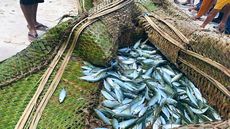
Traditional Fishing in Samoa
These photos of a traditional atule harvest are from the William Fell Collection in the Museum of Samoa taken approximately between 1928 and 1935. Nearly 100 years later, in the year 2020 this is still practiced in the Manu'a Islands to harvest the atule fish. This year the blessing was upon Olosega Village. It has fed all Fale Luanu'u. Schools of atule fish appeared on the coast of Olosega Village after the tropical storm Vicky & Wasi. The atule was in a perfect location for the village to prepare communal efforts for an atule harvest by traditional Samoan method, rather than by hook and fishing pole. Everyone in Olosega came together to make this a successful harvest These age old methods of fishing are being taught to young generations, to keep these sustainable ways of communal food gathering alive {{16672}} The atule harvest is not sold. Each family is given a share of the harvest. {{16677}} Successful Atule harvest in Olosega, Manu'a {{16685}} Traditional fishing of the atule fish in Olosega, Manu'a. {{16686}} Olosega Village harvesting atule. {{16694}} Olosega Villagers take advantage of the low tide to make a rock wall in preparation of catching and harvesting the atule. Little kids gather on shore to watch this beautiful traditional fishing method and hardwork leading up to the day of the atule catch. Blessed are those to witness this with their eyes, especially the young tupulaga of Manu'a {{16701}} Communal efforts by Olosega Villagers who have gathered to weave tapaau trap to be used as a lau to catch the school of atule. There are big black pods of atule out at sea off the coast of Olosega, which prompted the village to come together to harvest this blessing. {{16709}}
-
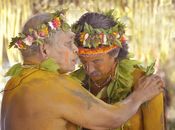
Carolinians Bring Pwo Ceremony to Saipan
"This is our life back home. It's what we depend on. We survive on the ocean." Pwo is a sacred initiation ritual, in which students of traditional navigation in the Caroline Islands in Micronesia become navigators (palu) and are initiated in the associated secrets.
-
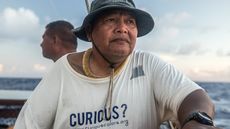
Okeanos Crew Profile - Yapese Master Navigator Ali Haleyalur
Micronesian master navigator Ali Haleyalur is dedicated to helping outer island communities vulnerable to climate change. Ali wants Okeanos Vaka Motus for all the islands so that traditionally based sustainable sea transportation can meet urgent day-to-day needs while serving as a platform for traditional voyaging practice.
-
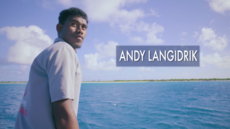
Okeanos Crew Profile - Andy Langidrik of Okeanos Marshall Islands
Okeanos Marshall Islands crew member Andy Langidrik is a brave open ocean sailor from Ailanloplop atoll. He shares his intensive learning on the Vaka, professional sailing, and traditional navigation of reading the stars and waves. Andy also shares Marshall Islands' great love of the #VakaMotu and RMI residents' requests for more vakas to provide much needed sea transportation to outer islands and jobs as vaka operators.
-
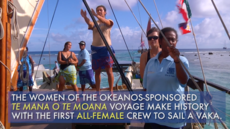
Real Life Moanas: The All-Female Crew of Te Mana o Te Moana
The women of the Okeanos-sponsored Te Mana o Te Moana voyage made history as the first all-female crew to sail a traditionally-based #vakamoana. Tongan sailor Aunofo Havea captained the sail through the Tahitian islands aboard New Zealand canoe, Hinemoana - Hawaiki Rising Voyaging Trust. The women represented all corners of the Pacific: Tonga, Fiji, Samoa, Tahiti, Aotearoa, Hawaii & more! Special thanks to the crews of Marumaru Atua - Cook Islands Voyaging Society, Samoa Voyaging Society, Faafaite - Tahiti Voyaging Society, The Uto ni Yalo, Te Toki Waka Hourua, & Te Matau a Māui Voyaging Trust for helping Okeanos bring gender equality to the Pacific.
-
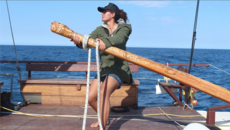
Okeanos Crew Profile - India Tabellini
Tahitian sailor India Tabellini has sailed on nearly every Okeanos vaka motu, sailing traditionally based canoes to the Marianas, Kiribati, Vanuatu, Marshall Islands & Pohnpei while helping train crew members along the way.
-
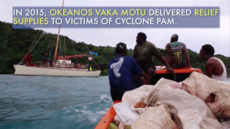
Okeanos Vanuatu Supports Sheperd Islands’ Agricultural Tourism
At the invitation of local chiefs, Okeanos Vanuatu makes weekly trips to Shepherds Islands, transporting local crops to be sold at market. Unlike cargo ships that service outer island groups months at a time, the Okeanos vaka motu relies on traditional Pacific knowledge while remaining fossil fuel-free.
-
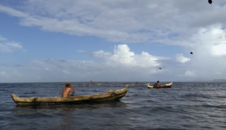
Spider Web Fishing in the Solomon Islands
This fascinating video shows how South Pacific islanders from the Solomon Islands archipelago use webs spun by a particular species of spider to catch a the needle fish! Source: BBC South Pacific
-
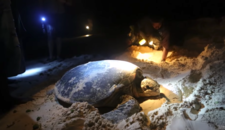
From Sand to Sea and back - Solomon Islands Sea Turtles
The Arnavon Islands in the Solomon Islands have long been an important nesting site for endangered sea turtles, but systematic hunting pushed local populations to the brink. Over the last two decades, however, local communities have banded together with The Nature Conservancy to protect the Arnavons and sea turtles. To aid in the nesting process, monitors protect the turtles' nests from predation. When the eggs are ready to hatch, the monitors assist the newly hatched turtles in their journey to sea. The number of sea turtles nesting in the Arnavons has doubled in the last 20 years.
-
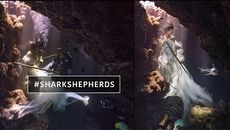
Shark Shepherd Photoshoot
Check out this awesome photoshoot taken underwater with sharks in Fiji! Fiji is known to ecotourists around the world for its world-class shark dives. As a photographer looking to create meaningful work, this was the perfect opportunity for Benjamin Von Wong to create a series of images that would promote their beauty while advocating for their protection. He wanted to create a series of images that would help break those stereotypes and show that it is possible for us to co-exist together in perfect harmony. For more information on Benjamin's work, check it out here! Photography: Von Wong Video editing: Adam Frimer - https://www.facebook.com/adamfrimer?f... Sound engineering: Andrew Kesler - http://andrewkesler.com Model: Amber Bourke - https://www.facebook.com/ambernerissa... Underwater video operator: Steve Hathaway - Young Oceans Explorers Drone operator: Joost Glaser - https://www.youtube.com/channel/UC_mR... Shark Expert: Thomas Vignaud Dive Team: Lydia Murray, Kris Mcbride, Rachel Young, Carlo Acosta Screenwriting: Yonatan Kanaskevich
-
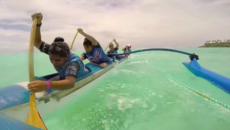
Vaka Eiva 2015 Series - Junior Competition
Matson Vaka Eiva 2015 is the premier paddling event for the Cook Islands in this its special year of the nations 50th anniversary celebrations. With paddlers from all over the Pacific vying for the top prize, the Vaka Eiva festival is in it's 12th year! There's also a whole heap of action off the water – arts, food and cultural festivals make for an eye opening experience for both first time visitors and returning paddlers. Video credit: Varo Media
-
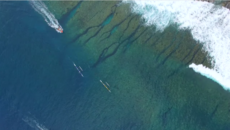
Vaka Eiva 2015 Series - Relay Races
Matson Vaka Eiva 2015 is the premier paddling event for the Cook Islands in this its special year of the nations 50th anniversary celebrations. With paddlers from all over the Pacific vying for the top prize, the Vaka Eiva festival is in it's 12th year! There's also a whole heap of action off the water – arts, food and cultural festivals make for an eye opening experience for both first time visitors and returning paddlers. Video credit: Varo Media
-
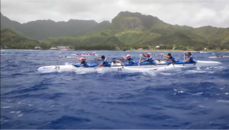
Vaka Eiva 2015 Series - V6 Iron Races
Matson Vaka Eiva 2015 is the premier paddling event for the Cook Islands in this its special year of the nations 50th anniversary celebrations. With paddlers from all over the Pacific vying for the top prize, the Vaka Eiva festival is in it's 12th year! There's also a whole heap of action off the water – arts, food and cultural festivals make for an eye opening experience for both first time visitors and returning paddlers. Video credit: Varo Media
-

Vaka arrival in Aitutaki
On the 29th of May, five traditional Polynesian voyaging canoes arrived at Aitutaki from Rarotonga. Very strong winds and currents meant the canoes needed to be towed through the passage to the harbour where a crowd of Aitutakians were waiting to welcome the visitors with dance, song and of course kai. Makea Vakatini Ariki is a long time supporter of the Marumaru Atua - Cook Islands Voyaging Society and made the journey from Rarotonga.
-

Sail like our Ancestors (Vaka)
‘Vaka’ - voyaging the great seas, navigating by the stars and connecting our necklace of Pacific Islands. Our Polynesian tradition of vaka voyaging was the most sophisticated in the world –we were the masters of the biggest ocean mass on the planet. In recent years this ancient art has been revived through ‘Pacific Voyagers’ and the building of seven ‘Vaka Moana’ a fleet of ocean voyaging vaka from different islands. Their aim is to reconnect with the traditions of Pacific communities and the ocean, to spread the message of ocean protection Their mission is simple: “Use the wisdom of the ancestors, combined with modern science, to propel us into a more sustainable future, to help heal our injured ocean, to raise awareness, and to revive the cultural traditions of voyaging. We know that the health of the oceans reflects the health of the people. And when we truly acknowledge this insight, when we are aware of extensive threats to the ocean, and when we care about the future of our children, the only logical step is to create a new vision, a sustainable sail plan based on values of interconnectedness, respect and stewardship.”
